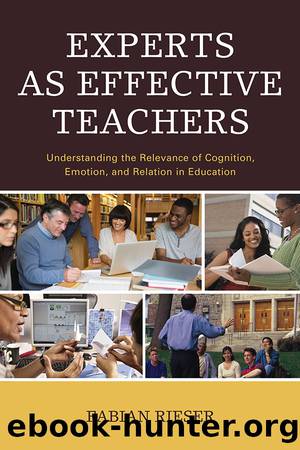Experts as Effective Teachers by Rieser Fabian;

Author:Rieser, Fabian; [Rieser, Fabian]
Language: eng
Format: epub
Publisher: Rowman & Littlefield Publishers
Published: 2015-08-15T00:00:00+00:00
Chapter Ten
Emotion in Detail: Fear
To see the concept of emotion as a construct and as consisting of different components consequently means that diverging accesses are possible toward the subject. An emotion like anxiety can be analyzed from various perspectives: from a psychological point of view it can mean the subjective experience of feeling fear, but on a greater scale also the central alarm system of our body aiming to keep us out of harmâs way and to alert us toward danger.
According to Tarr Krüger (see 1998, 96), fear is a feeling (as opposed to feeling a precise pain, for instance) that tends to enwrap the individual totally. To reflect on the phenomena of anxiety is therefore highly relevant for learners pursuing a career in a wide variety of professional occupations. Surgeons, pilots, athletes, musicians, and public speakers, to name a fewâthey all have to face anxiety and nervousness in their professional capacities. To a certain degree, their income or even their life might depend on possessing internal regulating mechanisms, which allow them to professionally counter anxiety.
Education offers a wealth of possibilities to obtain these mechanisms. Academic achievement is evaluated through exams, papers, presentations, and lectures. The act of being evaluated already implies an unbalance in hierarchy, because it implies that a superior exists who has the right and the obligation to assess an individualâs achievements. Because of this inherent hierarchy, learners might feel vulnerable. If the process of evaluation proceeds without transparency, this effect might even be amplified to feeling unprotected and abandoned.
In combination with a high degree of intrinsic motivation, a strong anxiety level may occur. Additionally, students may fear to expose themselves and their achievements to public criticism or even humiliation. Students can in most cases be seen as highly motivated, because they know both implicitly and explicitly that their professional future relies on succeeding academically. Thus, evaluations are inherently anxiety provoking.
In interviews (see Bork 2010, 211ff.), music students were asked about performance-related negative feelings, to which they reported having exam anxiety, strong self-doubt, panic, and tunnel-type vision, and they summarized their experiences as âa nightmare.â These statements show that exams and performances have the feature of concentrating the individualsâ fears in one concrete situation. Stage fright or the overall nervousness combined with performing publicly does therefore not constitute a malady. Quite oppositely, these feelings are symptoms for powerful mental processes, which arise from the subconscious.
Thus, anxiety does often indicate psychological dispositions, which remain hidden and undetected in everyday life. In situations with high motivational value (like exams, performances, and lectures), they tend to come to the surface and are often impeding the individualâs effort to perform on his or her level. Feelings of anxiety and its physiologic consequences (trembling of hands, concentration lapses, and others) can greatly affect the professional performance ability.
The strength of the emotional involvement of the individual matches the subjectively perceived threat. At the same time, this relates to the degree of intrinsic motivation. The higher the affective value of a situation,
Download
This site does not store any files on its server. We only index and link to content provided by other sites. Please contact the content providers to delete copyright contents if any and email us, we'll remove relevant links or contents immediately.
The Art of Coaching Workbook by Elena Aguilar(51199)
Trainspotting by Irvine Welsh(21666)
The Secret History by Donna Tartt(19090)
Twilight of the Idols With the Antichrist and Ecce Homo by Friedrich Nietzsche(18633)
All the Missing Girls by Megan Miranda(16029)
Cat's cradle by Kurt Vonnegut(15356)
Ready Player One by Cline Ernest(14675)
Talking to Strangers by Malcolm Gladwell(13370)
Fangirl by Rainbow Rowell(9251)
The remains of the day by Kazuo Ishiguro(8999)
The Compound Effect by Darren Hardy(8968)
Thirteen Reasons Why by Jay Asher(8910)
Tools of Titans by Timothy Ferriss(8396)
Periodization Training for Sports by Tudor Bompa(8273)
Wonder by R. J. Palacio(8110)
The Lover by Duras Marguerite(7903)
A Court of Wings and Ruin by Sarah J. Maas(7847)
Change Your Questions, Change Your Life by Marilee Adams(7783)
The Complete Stick Figure Physics Tutorials by Allen Sarah(7373)
